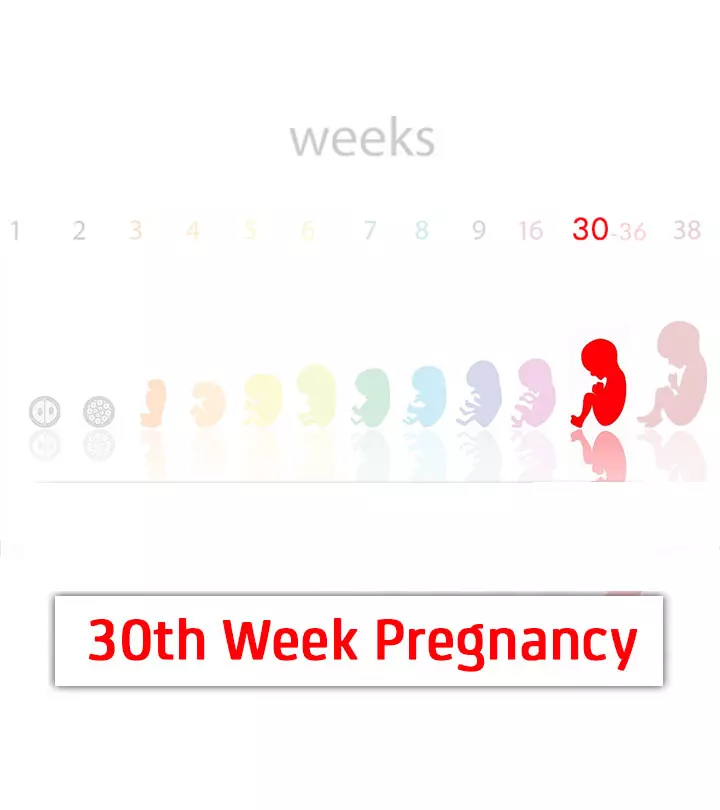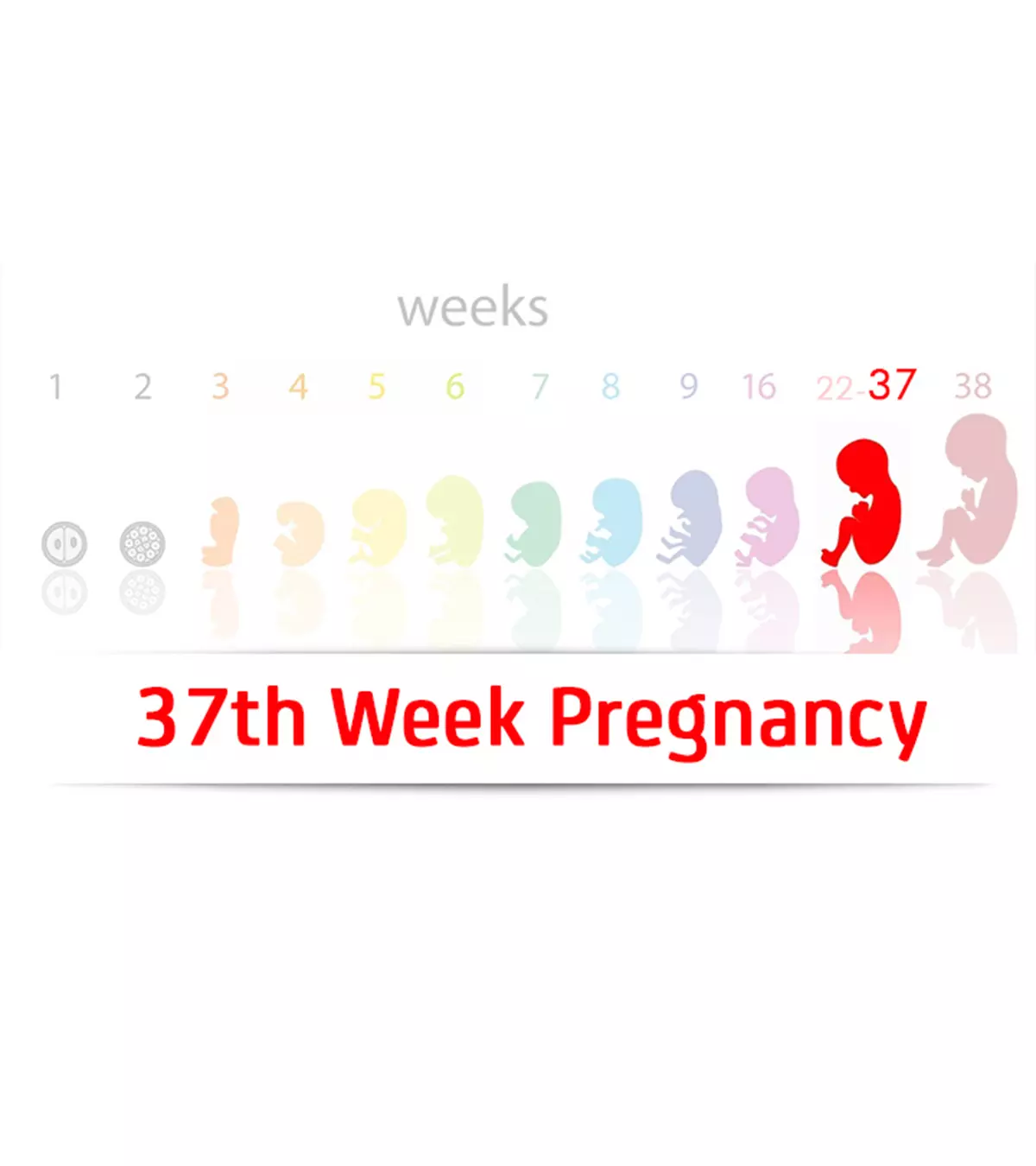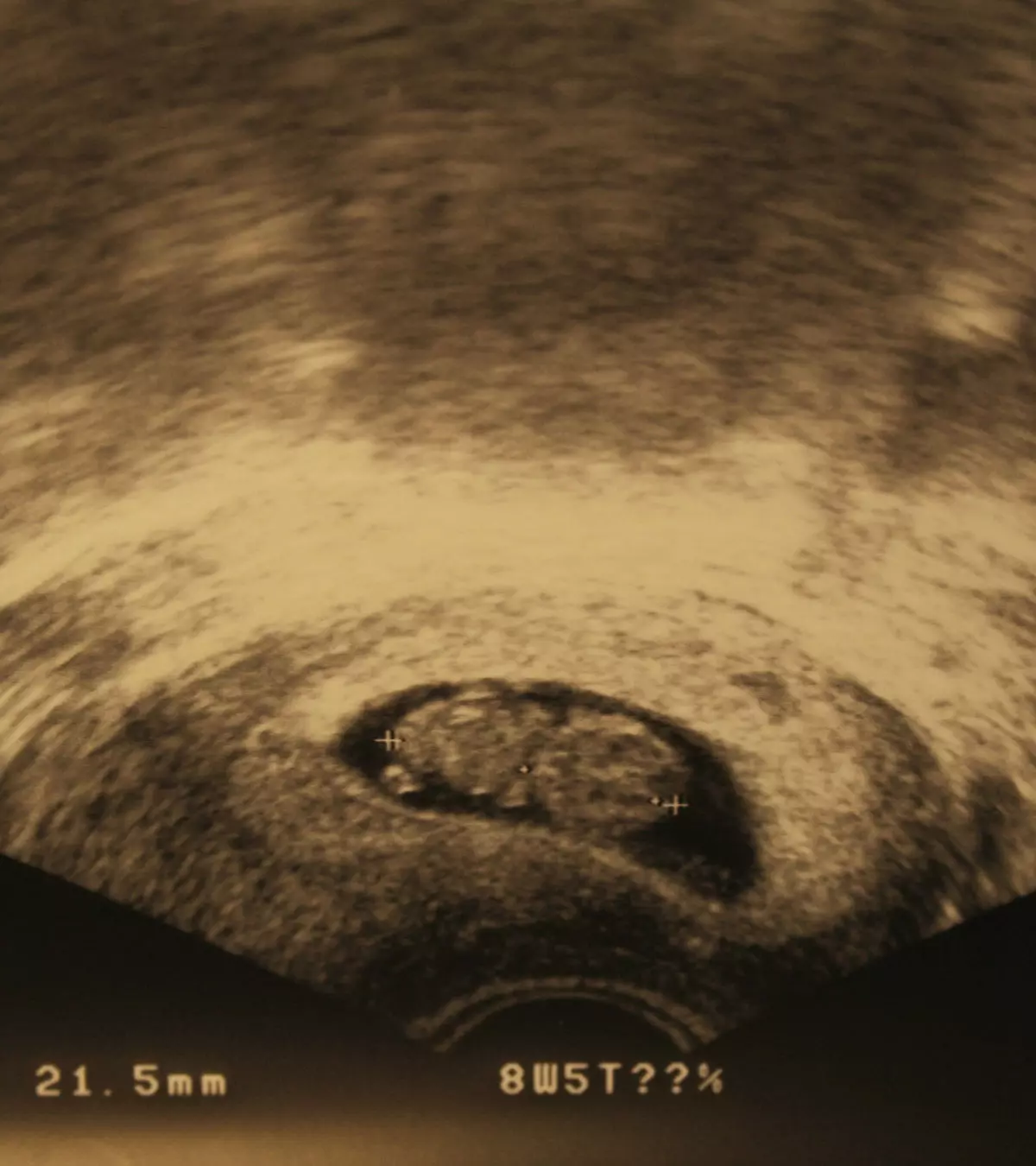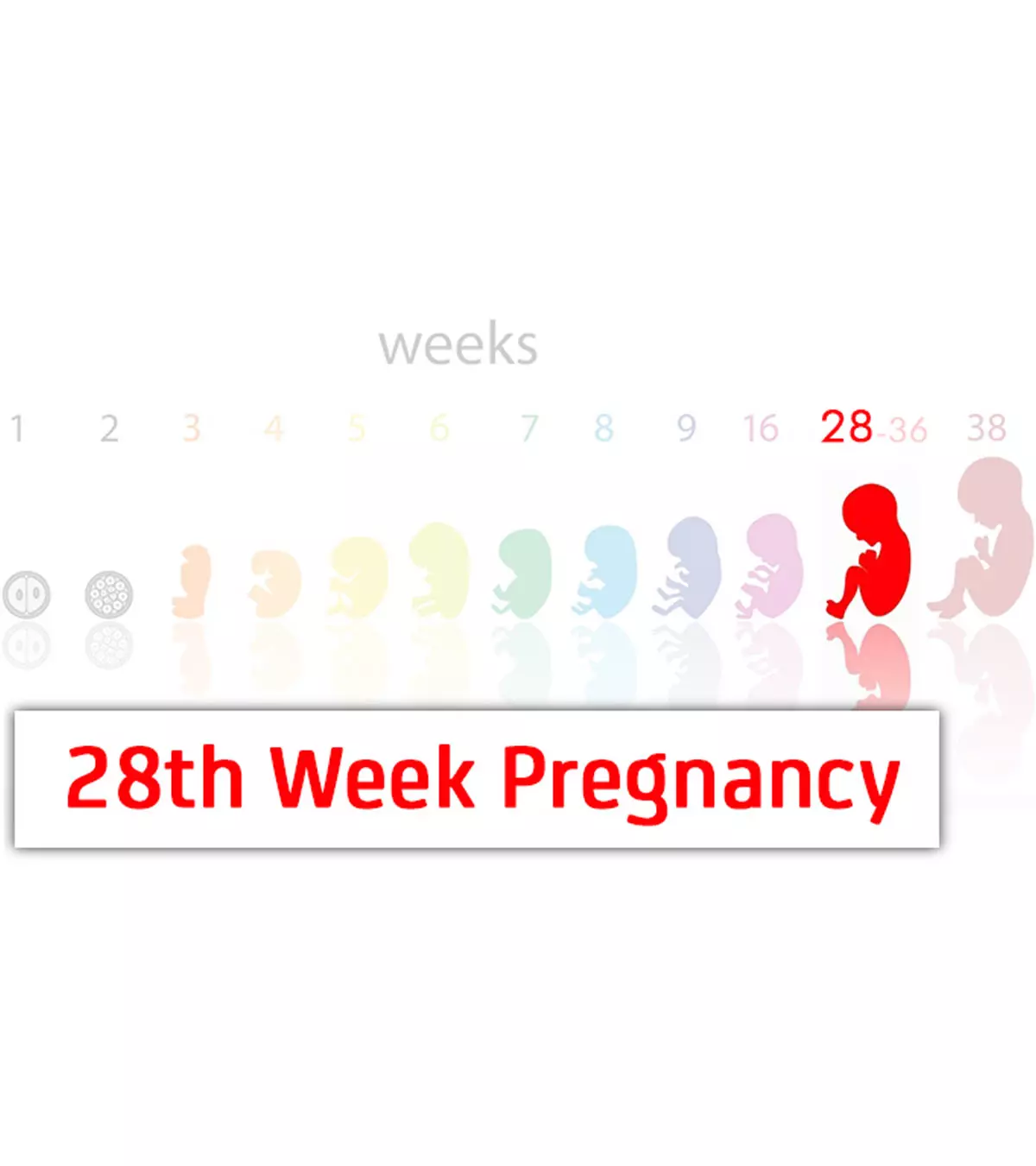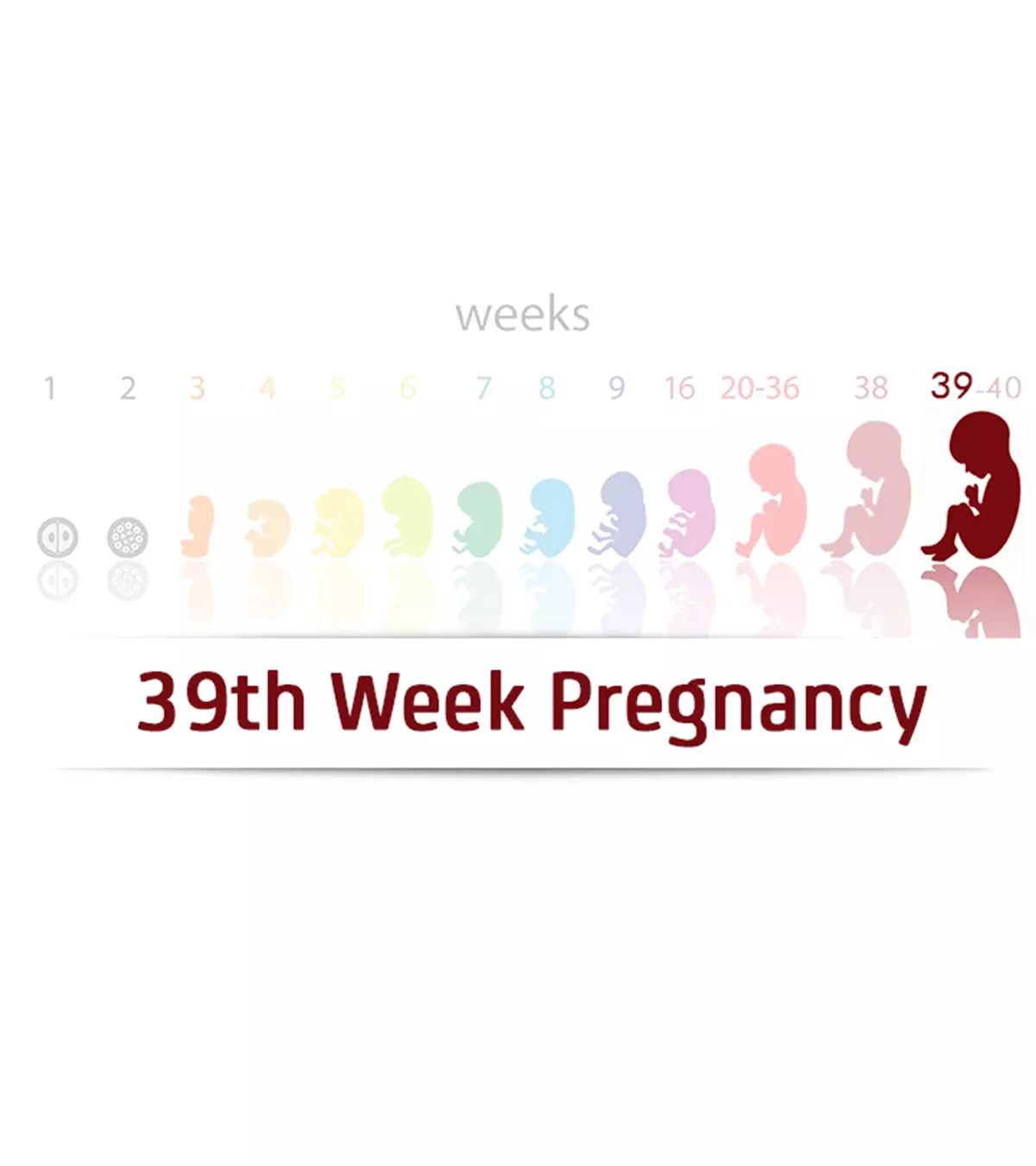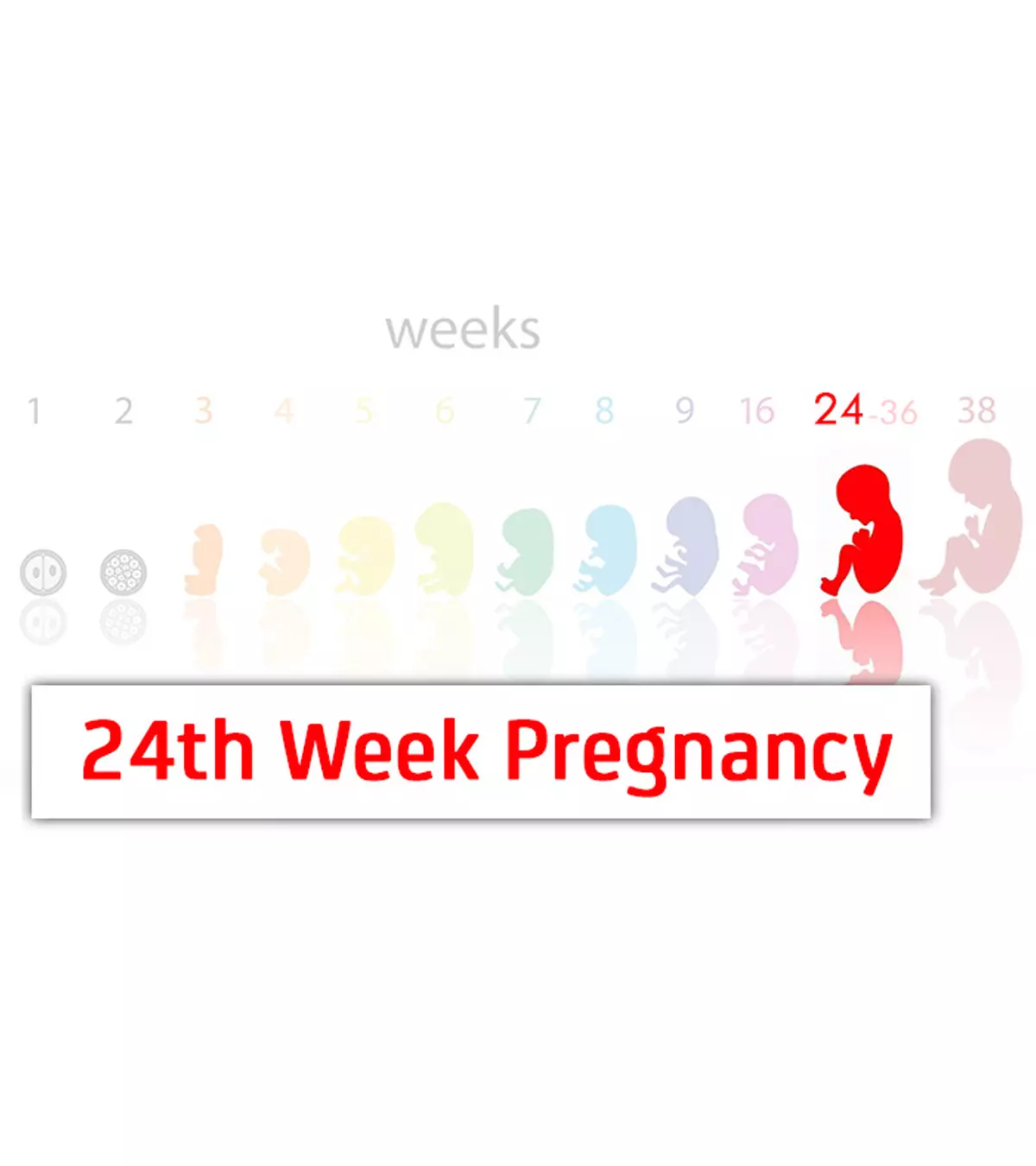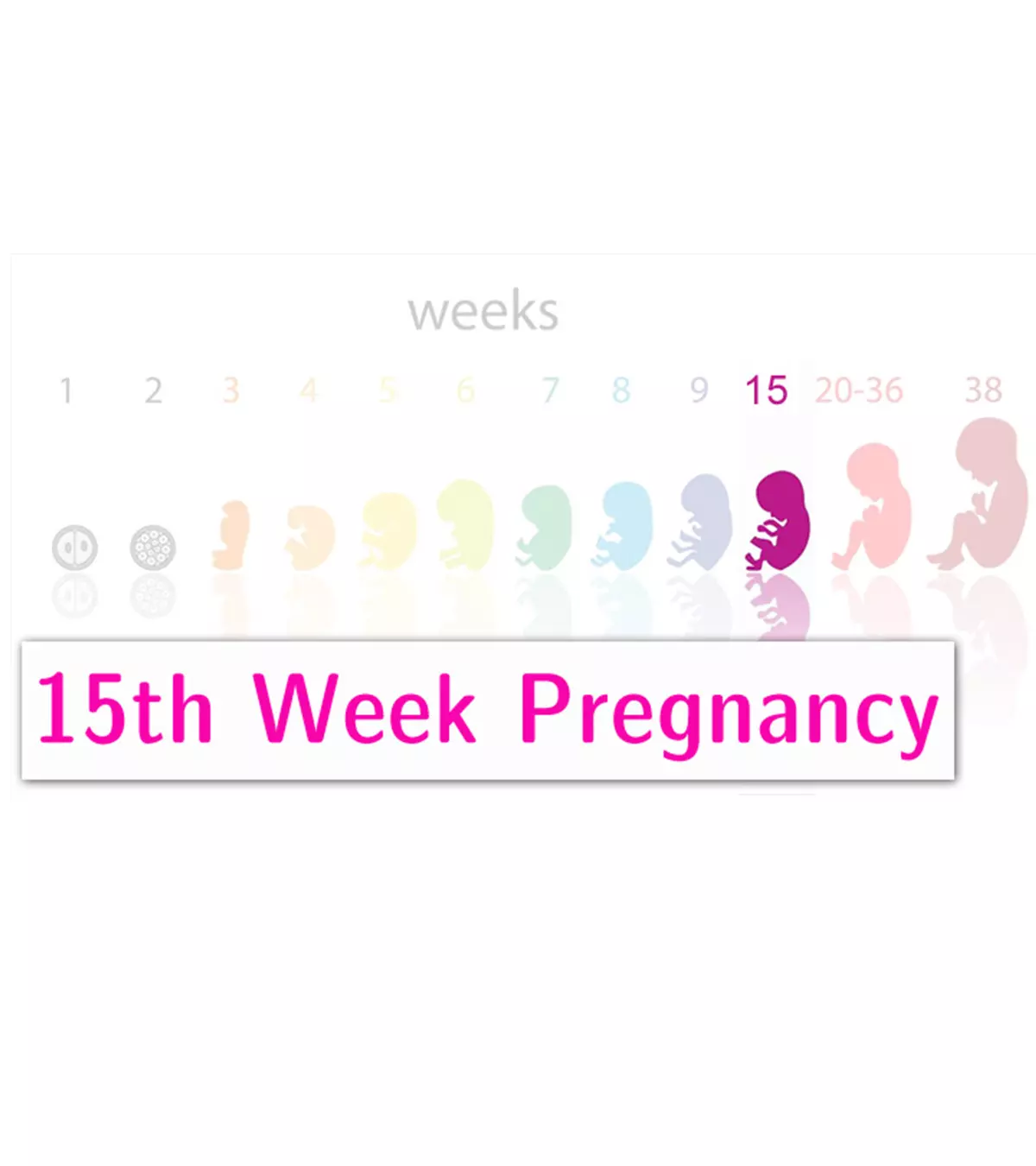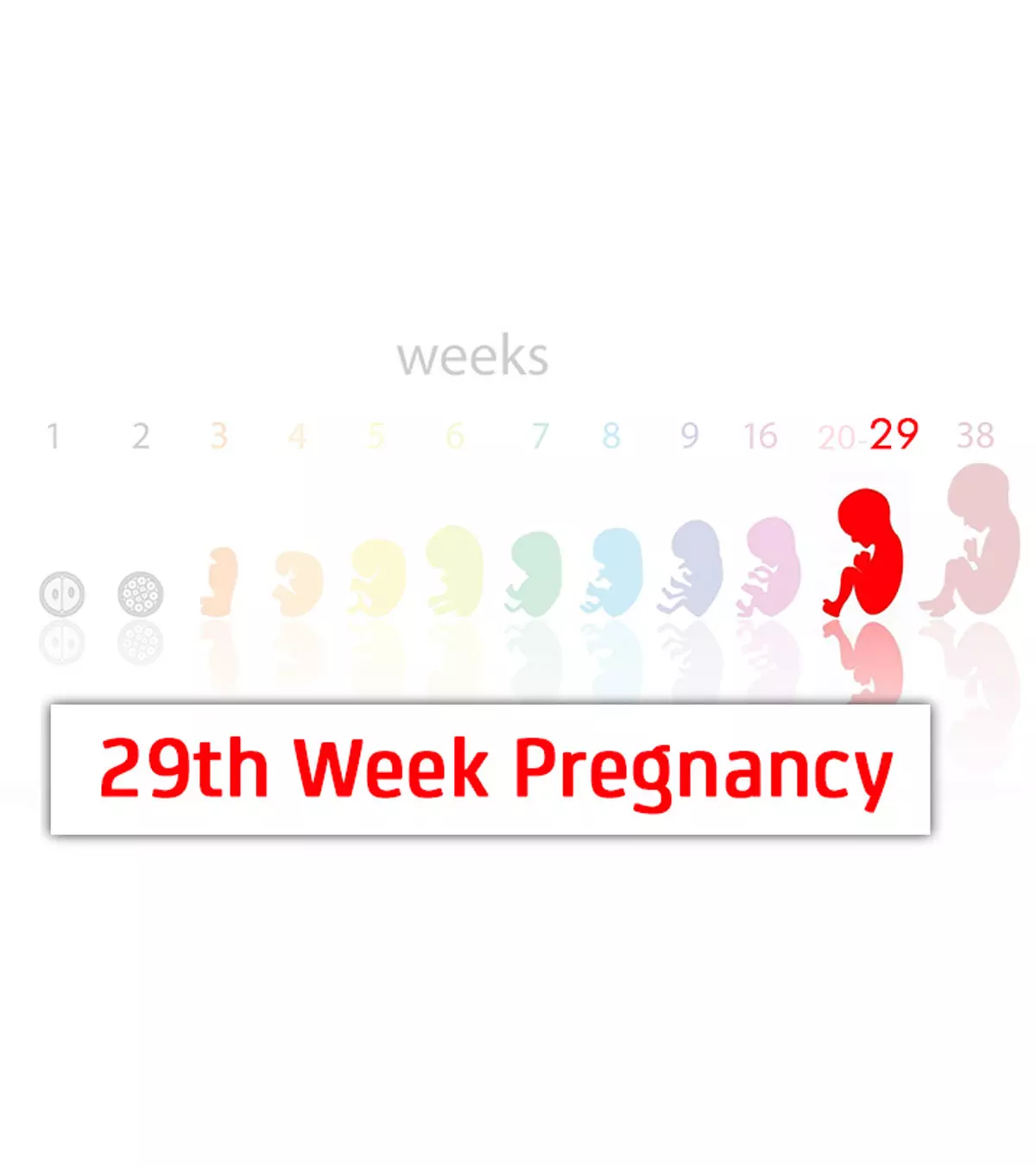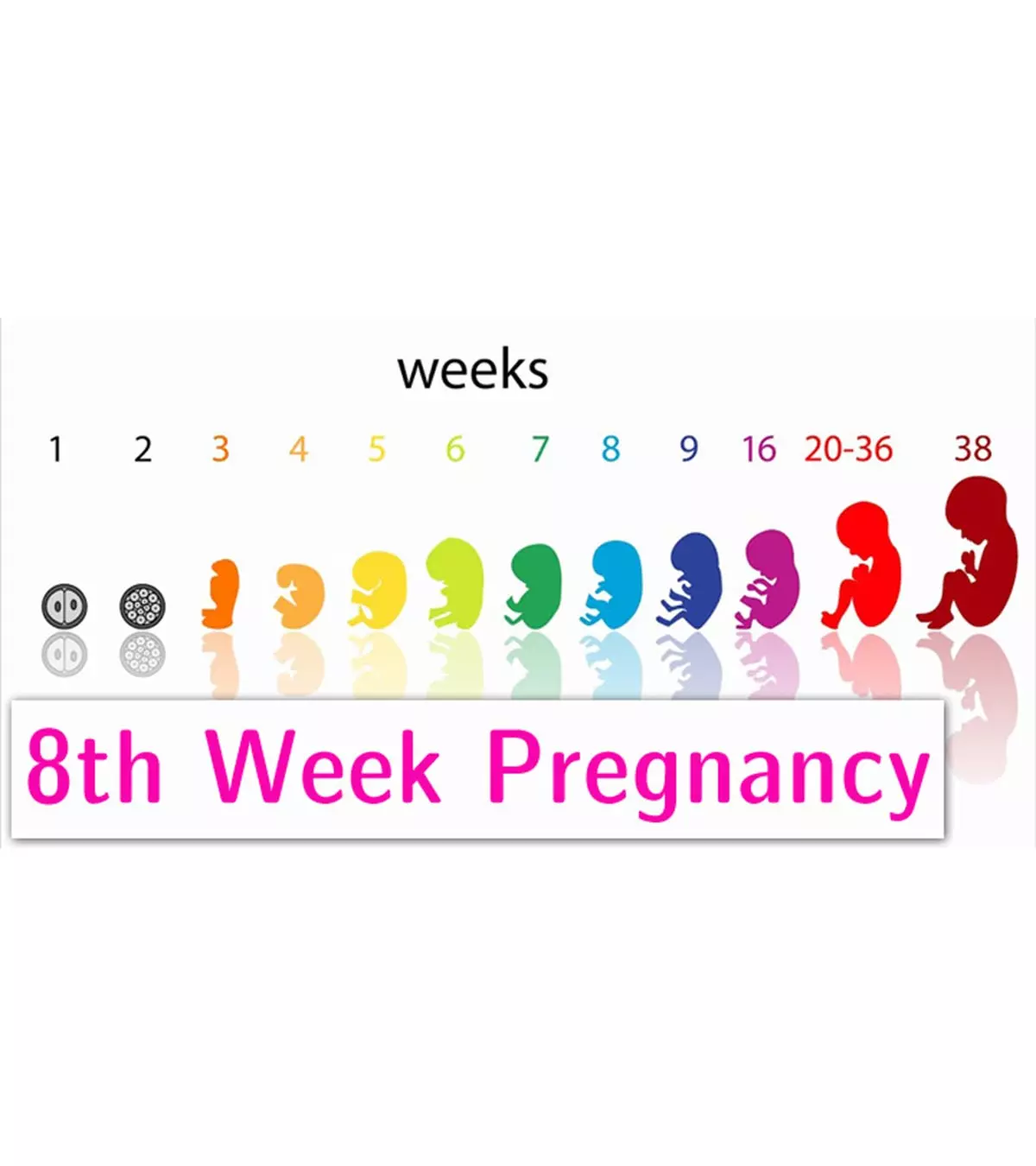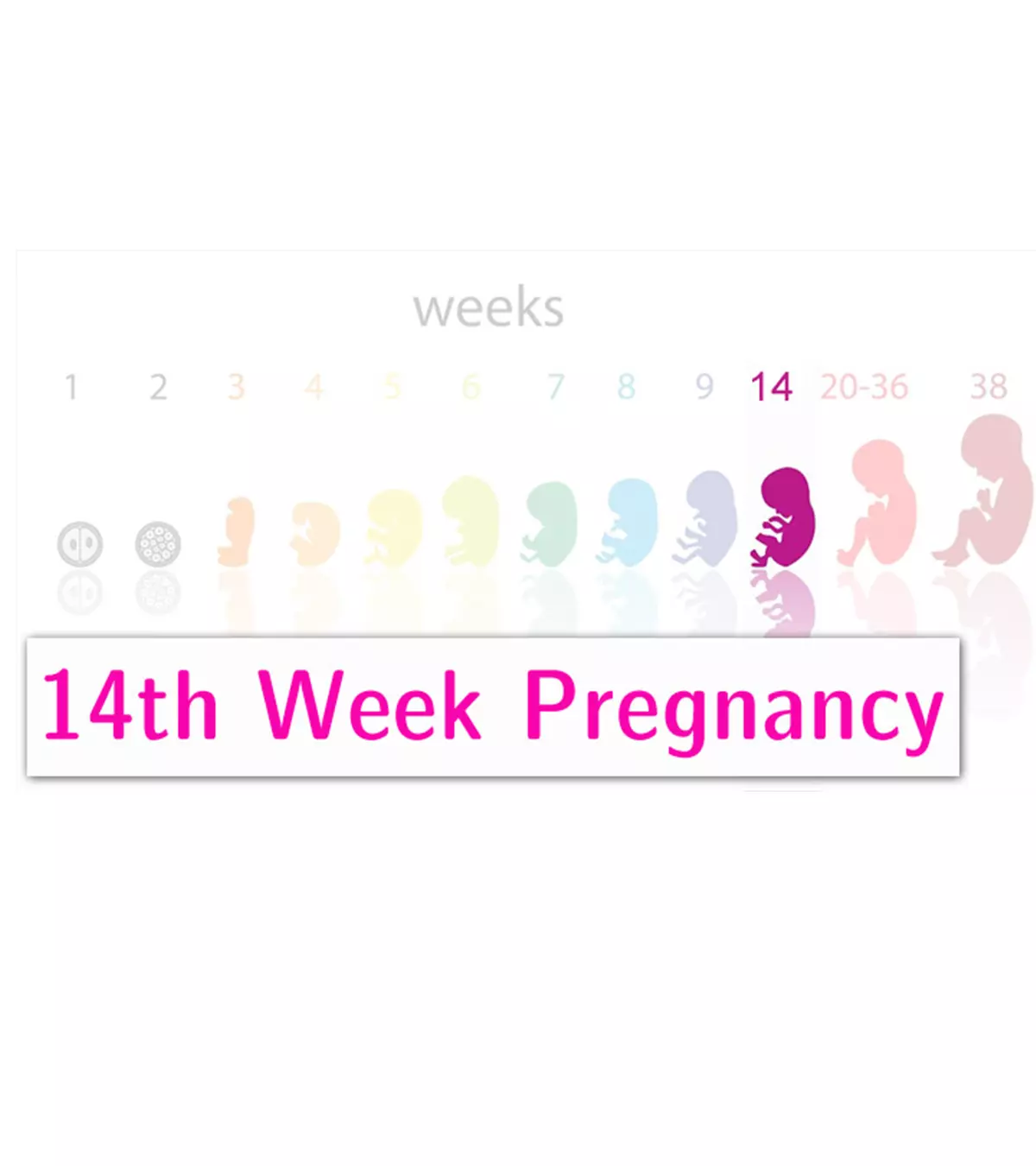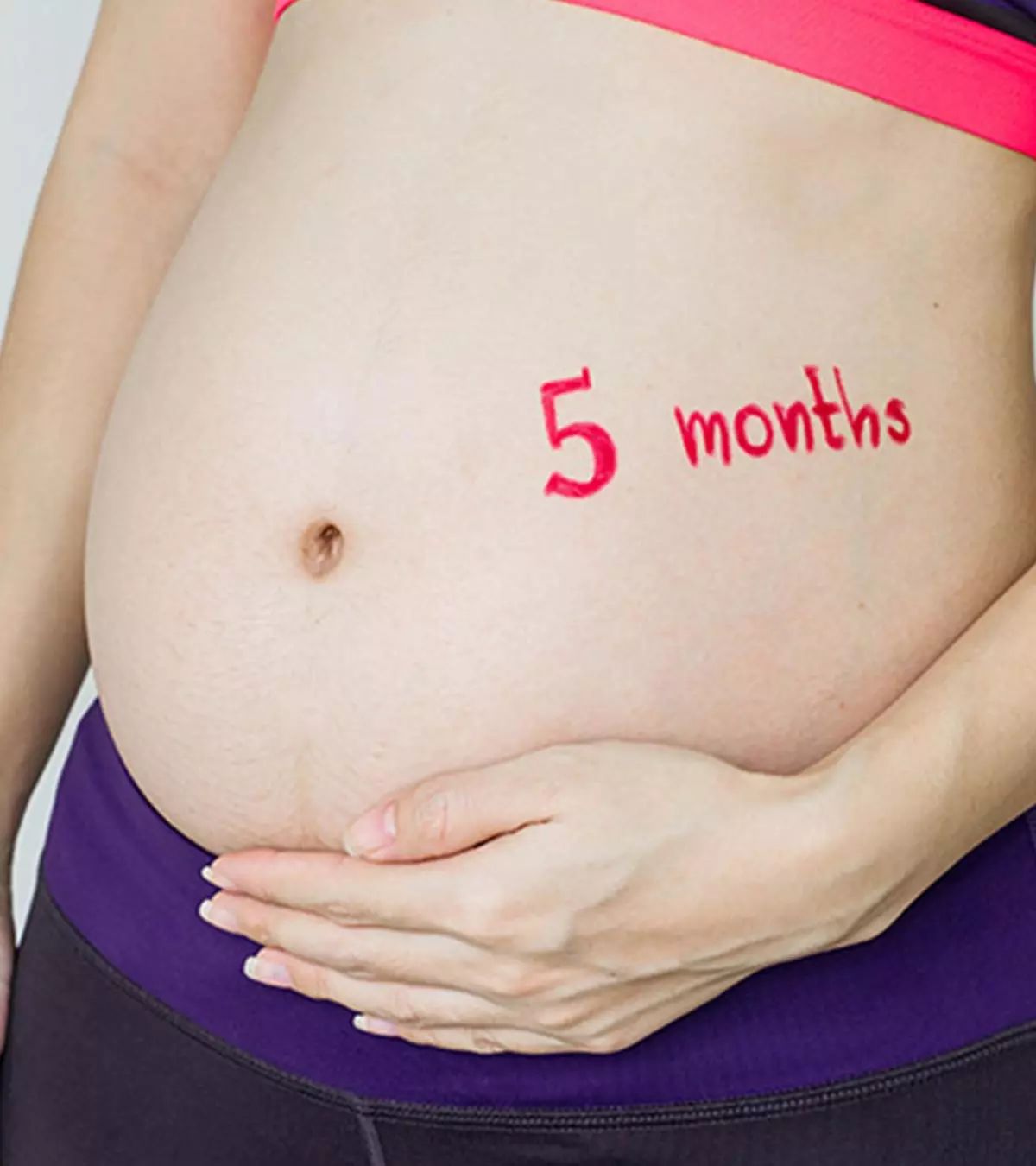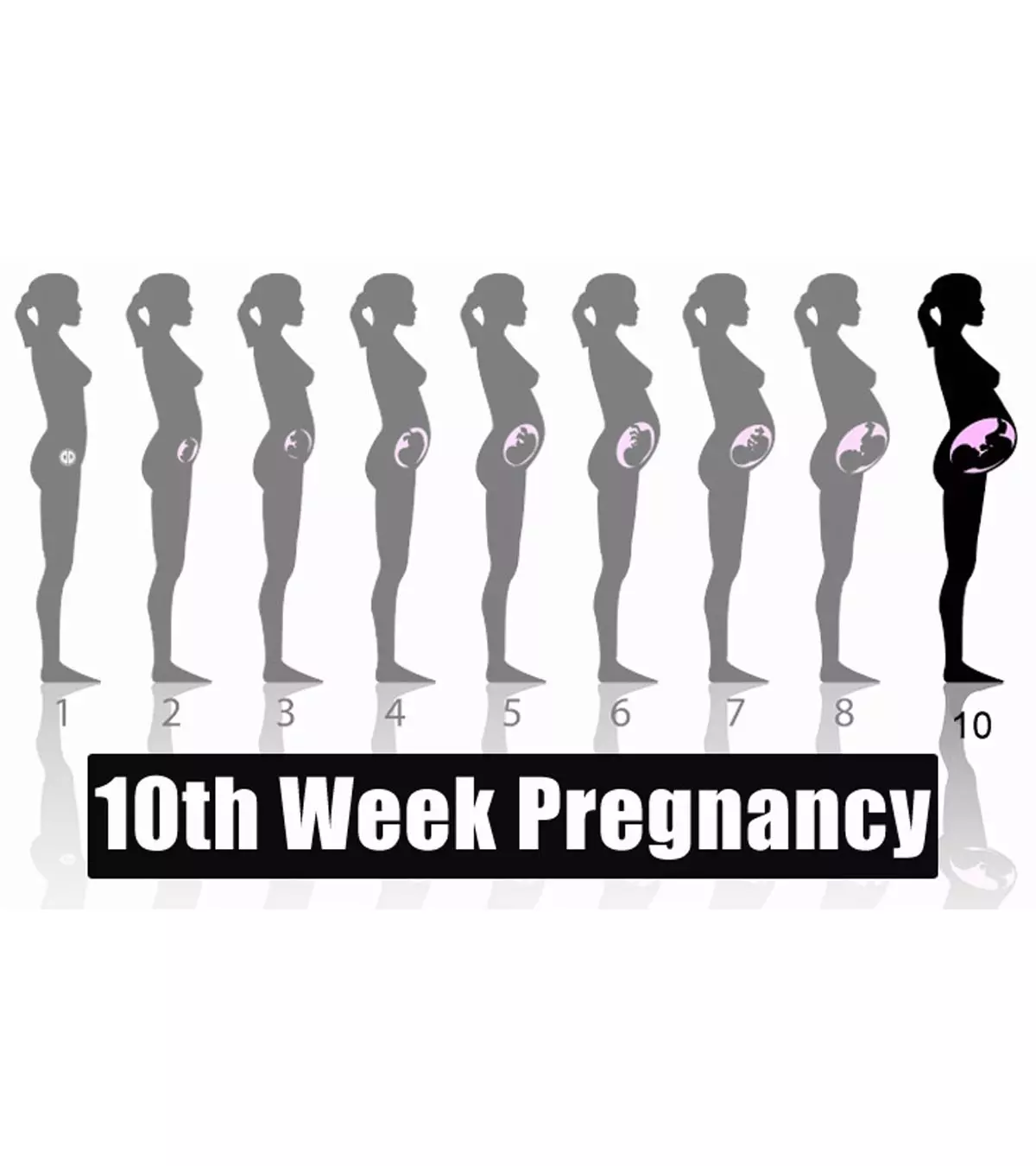
Image: ShutterStock
The 10th week of pregnancy bears significance. This is the time when the embryo develops into a fetus as it prepares for the outside world (1). You will feel its presence and be able to notice its progress in your first OB/GYN visit during this week.
So, if you are curious to know more about the 10th week, continue reading. In this post, we tell you all about the 10th week, including the care and precautions you need to take, foods to eat, and more.
Key Pointers
- The fetus begins developing muscles, fingers, toes, and internal organs during the 10th week of pregnancy.
- Mothers often experience morning sickness, followed by weight gain and fatigue as the baby’s weight increases.
- Hormonal changes during this phase can cause fluctuating emotions and a loss of interest.
- Having a healthy and vitamin-rich diet, exercise, and adequate rest are essential during this week.
How Big Is Your Uterus At Week 10 Of Pregnancy
By the tenth week of pregnancy, your uterus is likely to grow about the size of a grapefruit.

Image: infobaby.org
How big is your baby in week 10?
By the tenth week of pregnancy, your baby attains the size of a strawberry measuring about 1.2 inches in length (from crown to rump) and weighing about 0.14 ounces.
Your baby has now moved from the fetal stage to the embryonic stage. Let’s have a look at the major developments happening in your baby in the tenth week.
Baby Development In Week 10 Of Pregnancy
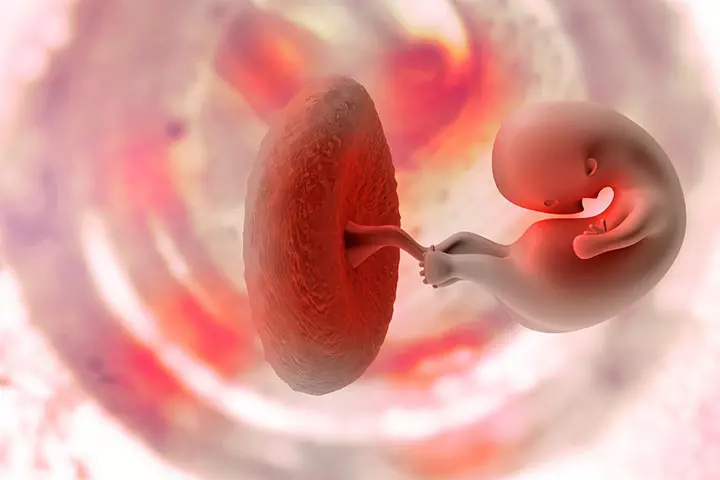
Image: IStock
| Body parts | Developmental stage |
|---|---|
| Facial features | More distinct now |
| Mouth | Tooth buds and tongue start developing; starts swallowing amniotic fluidiA Clear, yellowish liquid surrounding and protecting the fetus during pregnancy. |
| Ear | Starts taking shape |
| Muscles | Mostly developed |
| Neck | Starts taking shape |
| Eyelids | Begin to close to protect baby’s eyes |
| Brain | The forehead looks bulged due to brain development. Head looks bigger than the body. About 250,000 new neurons (first brain cells) are produced every minute. |
| Hair | Fuzz hair starts growing on the body. The tender hair is also called peach-fuzz or baby-fuzz, and it helps protect the skin (2). |
| Fingers and toes | No longer remain webbed |
| Nails | Start developing on fingers and toes |
| Fingerprints | Develop unique fingerprints that are visible on the skin |
| Movements | Small fetal movements that can be detected only through ultrasound scan (3) |
| Heart | Fully developed with four chambers. It beats at the rate of 180 beats/minute |
| Internal organs | Kidney, brain, liver, and intestines start functioning |
| Elbows and knees | Start to bend. Arms are longer than legs |
| Bones | Cartilage is now being replaced by bones |
| Genitalia | Formed by this week |
| Yolk sac | Begins to shrink. The placenta is fully matured and functioning |
| Umbilical cord | Carries blood between the placenta and the fetus |
 Quick fact
Quick factChanges In Your Body In Week 10 Of Pregnancy
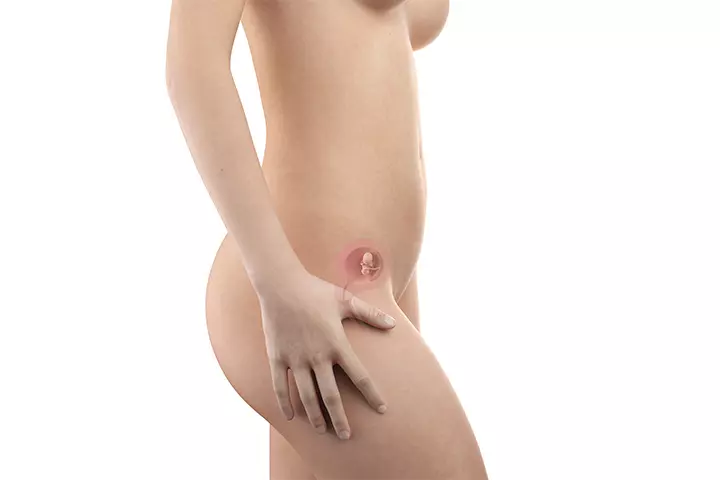
Image: IStock
In the tenth week, the pregnant belly starts showing up because your baby is growing faster by this time. The belly might not be noticeable for others, but you may find your clothes getting tight at the waistband.
Physical changes likely to happen during the tenth week of pregnancy
- Pregnancy glow: A fresh, glowing look is noticeable during this period. The increased level of hormones in your body causes oil secretion on your face, which makes your skin look healthy, supple, shinier, and plump.
- Weight gain: You might notice a weight gain of around five pounds by the tenth week of pregnancy (4). You do not have to worry if you have not gained the recommended weight because morning sickness might actually make you lose weight.
- Growing breasts: You might notice an increase in your breast size as they start preparing for breastfeeding. Also, the areola becomes darker and larger (5). Also, there can be pain in the breasts.
- Visible veins: The blue veins become more prominent on different parts of your body as well as breasts as they prepare for the growing needs of the baby.
- Round ligament pain: You might feel some pains and aches in your abdomen due to the stretching of the ligament to support your growing uterus during pregnancy. In a twin pregnancy, the pain is more intense than in a single pregnancy. Always check with your doctor about abdominal pain.
- Acne: Active androgen hormones could result in acne breakout on your face (6). If you had a history of acne before pregnancy, you have a higher chance of having them during this period.
- Vision changes: Increased blood circulation and fluid retention in the body during the tenth week of pregnancy can lead to blurred vision in some women or turn your eyes dry.
- Pregnancy gingivitis: The increased hormonal activity during pregnancy makes your gums sensitive and irritable. It causes swelling and bleeding of the gum, which is called pregnancy gingivitis. If left untreated, pregnancy gingivitis can increase your discomfort with the progressing pregnancy (7). According to the Centers for Disease Control and Prevention (CDC), approximately 60-75% of expecting mothers experience gingivitis due to the change in hormones.
- Fatigue: It is normal to feel fatigued during pregnancy because your body is working overtime to meet the demands of the developing baby. You might also experience disrupted sleep during this time.
- Morning sickness: Nausea and vomiting, known as morning sickness, are common by the 10th week of pregnancy due to hormonal and physical changes. For many women, these symptoms ease, with about half feeling better by the 14th week (2).
- Increased vaginal discharge: You may notice an increase in vaginal discharge. High estrogen levels and blood flow to the vagina lead to a clear and odorless discharge known as leukorrhea. This process prevents any bacteria from entering inside the uterus. However, if the discharge is tinged with blood and has a foul smell, causing discomfort, or is profuse and watery then call your doctor.
- Pain in abdomen: You might have cramps and pain in the lower abdominal region during the tenth week as your uterus is growing.
- Frequent urination: As the uterus grows, it puts pressure on your bladder. Also, the kidneys filter more blood during this time, which makes you pass urine more frequently. Stay hydrated and keep the bladder empty.
- Backache: The growing uterus shifts your center of gravity putting strain on your back. Also, the pelvic joints start preparing for the childbirth by dilating, leading to back pain. Always check with your doctor about your pain.
- Headaches: Hormonal changes also lead to headaches. Adequate intake of fluids, nutritional foods, and proper rest will help you get relief from headache during pregnancy. However, headache is an important symptom that you should check with your doctor (8).
Emotional changes
- Fears: You begin to fear about your pregnancy, the health of your baby, and about anything without reason. You might start having nightmares due to your subconscious worry about the pregnancy (9).
- Feel stressful: If you are working, you might find it difficult to cope with work pressure and health. Maternal stress may impact your health. Ask for leave if you are not able to adjust to the environment in your office. A break might help you get back to the routine.
- Lack of interest: All you want to do is sleep. You feel lethargic and find it difficult to move from where you sit. You just want somebody to do everything for you while you sleep and dream.
Make sure to take out some exclusive time for yourself as it can help overcome the emotional changes you might be going through during the pregnancy phase.
However, certain changes might require your doctor’s attention.
Victoria, a mother from Worcestershire/ West Midlands writes in her blog about the symptoms she experienced in the 10th week of pregnancy (as per medical records). She says, “When I wear trousers it feels a bit tighter in a waist area, I feel nauseous and sick, I have more things I don’t feel like eating than cravings, i’ve increased sense of smell driving me mad- feel sick when my hubby uses deodorant, feel sick when I’m in the kitchen while hubby cooks, just generally anything can trigger my sickness. Yesterday I felt sorry for myself, couldn’t stop crying (i).”
When To Call The Doctor?
You must see the doctor if you have:
- abnormal vaginal discharge or foul odor
- bleeding or cramping
- chills
- fever
- severe abdominal pain
- pain while urinating
- severe nausea with vomiting
You should also consult the doctor if you have any infections. Do not take over-the-counter medication.
Can You Get Infections During 10th Week Pregnancy?
You are vulnerable to three most common infections in the tenth week:
- Urinary tract infections: The higher levels of progesteroneiA female reproductive hormone that plays a vital role in menstruation, pregnancy, and breastfeeding. during this period relax the urinary tract, thereby slowing down the flow of urine. This gives room for bacterial growth in the urinary tract (10).
A UTI can also be caused when the intestinal bacteria from the rectum area travel to the urethra making their way into the urinary tract. This can lead to a bladder infection, also known as cystitis. The symptoms include pain or burning sensation during urination, frequent urge to pee, lower abdominal pain, and pelvic discomfort.
Cystitis, left untreated, can cause a kidney infection.
- Bacterial vaginosis: BV targets the genital tract, i.e., the vagina in a pregnant woman. This infection is associated with a thin, milky white or gray discharge with a foul smell (11).
- Yeast infections: The vaginal infection is caused due to the hormonal changes, which alter the pH balance and facilitate faster growth of yeast in that area.
The tenth week is not just about changes and infections but is also the time to have the first glimpse of your baby.
Ultrasound At Tenth Week
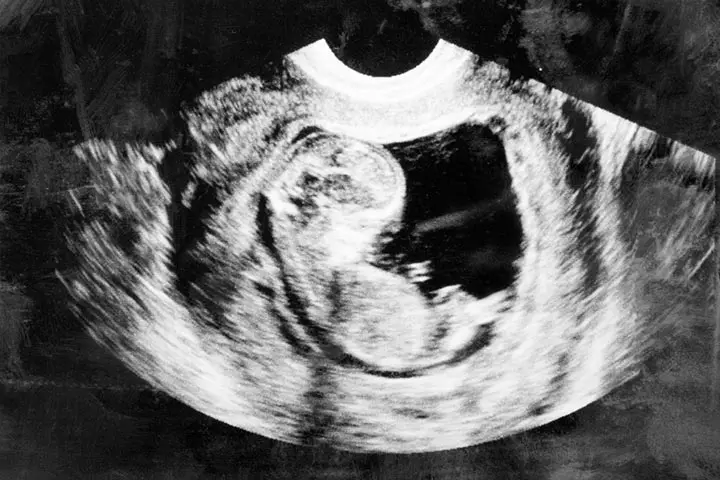
Image: Shutterstock
You are likely to have your first ultrasound scan this week to check the fetal growth. Ultrasound:
- shows the baby’s head.
- detects the fetal heartbeat. In an ultrasound, it is possible to see the heart functioning and the parents may hear the heartbeat that resembles the sound of galloping horses.
- shows the baby sucking the thumb (if you are lucky) (12).
- shows the functioning of internal organs through the baby’s translucent skin.
The ultrasound is done as part of your visit to an OB/GYN, who will also take up other crucial diagnoses.
Other Likely Tests During Your OB/GYN Visit
At week-10 of pregnancy, your obstetrician might recommend a few special tests:
- Non-invasive prenatal test (NIPT): It is a maternal blood test typically done in the tenth week or later. This test is carried out to screen the mother’s blood to check for any signs of Down syndromeiChromosomal disorder (trisomy 21) characterized by reduced muscle tone, delayed physical and intellectual development. , Patau syndromeiCondition marked by genetic duplication of chromosome 13 in an individual, leading to severe neurological and physical defects. , Edward syndromeiCondition marked by genetic duplication of chromosome 18 in an individual, leading to severe developmental delays. and other chromosomal abnormalitiesiDisorders caused due to anomalies in the number, structure, or composition of chromosomes. (13).
- Chorionic villus sampling: The doctor will collect a small sample of the chorionic villi tissue from the placentaiA temporary organ that develops during pregnancy and provides the fetus with oxygen and nutrients. , and lab-test it for specific fetal disorders. CVS is performed between 10 and 12 weeks in the case of high-risk pregnancies if,
- a woman has a family history of genetic disorders.
- she is above the age of 35 years.
- she or her partner has chromosomal rearrangement (14).
- Amniocentesis: In this invasive procedure, a needle is inserted into your uterus through the abdomen to extract some amniotic fluid from the amniotic sac. The sample is tested for any chromosomal abnormalities. The test can be carried out as early as between 10 and 12 weeks as early amniocentesisiA prenatal test used to evaluate genetic and health abnormalities in the fetus using cells from the amniotic fluid. or will be done after 16 weeks of gestational age (15).
- NT scan: You may be asked to get an NT scan to rule out chromosomal problems in the fetus, between 11 and 14 weeks of pregnancy.
Note that these tests are not necessary for every pregnant woman but only for those who have a history of chromosomal diseases in their families or in the cases where the doctor suspects something to be wrong.
In other safer cases, it is just the ultrasound and some comprehensive blood tests. Of course, you need to follow it up with some self-TLC.
 Things to know
Things to know10 Tips For A Better 10th Week Pregnancy
The first trimester is the most difficult phase of pregnancy. You may want to follow these tips to ease up the discomforts of the tenth week.
- Avoid wearing tight clothes. Instead, wear loose shirts and elastic waistband pants. Buy maternity bras.
- Avoid cleaning your pet’s litter box during this time. It prevents transmission of any parasitic infection through the pets.
- Do not take any medications without your doctor’s prescription.
- Follow oral hygiene to prevent gingivitis. Brush your teeth twice every day, and go for regular dental check-ups.
- Join groups and forums where you can share your experiences with other pregnant women. This helps cope with the pressures and stress you go through during pregnancy. If required, you may talk to a professional about your emotional upheaval.
- Share your dreams, hopes, and fears with your partner. Help him understand what you are going through. Discuss your future with the newborn. This will make you feel relaxed and calm.
- Take adequate rest and have a sound sleep to fight fatigue. An eight-hour sleep in the night will rejuvenate your body.
- Keep yourself busy by reading books and doing activities that can have a positive impact on your developing baby.
- You will still have morning sickness in the tenth week. It means your aversion to food would also be there. However, this should not stop you from having nutritional food.
Nutrition In The 10th Week Of Pregnancy
On an average, a woman needs 2,200 calories a day. However, during pregnancy, it increases by 300 calories to 2,500 calories, if your weight is normal. In the case of twins or more, you need more calories.
Here is the list of foods you may include in your tenth-week pregnancy diet.
1. Healthy snacks and drinks:
You feel hungry often. Keep some healthy snacks ready so that you can avoid the temptation of eating junk food. You may eat:
- Rusks
- Whole grain crackers
- Sandwiches and pitta bread with grilled chicken or grated cheese
- Breakfast cereals, porridge with milk
- Fresh fruits
- Vegetable and bean soups
- Apricots, prunes, and figs
Healthy drinks:
- Homemade jal jeera
- Lemonade
- Aam panna
- Ginger tea
- Homemade tomato soup
2. Vitamin B rich foods:
Vitamin B6 helps in the production of red blood cells (16). Vitamin-rich foods include:
- Bananas
- Brown rice
- Lean meats
- Poultry, fish
- Avocados
- Whole grains
- Corn
- Nuts
Deficiency in vitamin B12 can cause anemia in you or neural birth defects in the baby (17). Vitamin B12-rich foods include:
- Meat
- Dairy product
- Soya milk
- Breakfast cereals
- Yeast extract
3. Magnesium:
It helps in maintaining muscle strength and immune system. Magnesium-rich foods include:
- Salad greens
- Nuts
- Soya beans
- Whole grains
- Weeds of pumpkin, sunflower, and melon
- Dried fruits such as figs, raisins, and apricots
- Green leafy vegetables such as radish leaves, spinach, mustard greens, lamb’s quarters, lettuce, and fenugreek leaves.
- Vegetables including bitter gourd, bottle gourd, peas and sweet corn.
- Whole wheat and brown rice.
- Pulses such as green gram and kidney beans.
- Dairy products including cottage cheese, milk, and curd/yogurt.
- Fish, poultry, and meat
Here is a diet chart that you may follow in week-ten of pregnancy (18):
| Foods | Number of servings/day |
|---|---|
| Rice and alternatives | 6 to 7 |
| Fruits | 2 |
| Vegetables | 3 |
| Meat and alternatives | 2 ½ |
| Milk | 500ml |
Good food should be clubbed with some good and safe physical activities to keep yourself active.
Exercises During The 10th Week Of Pregnancy
Exercise for 30 minutes every day to keep yourself fit and active. However, take your doctor’s consent before beginning any of these. Here are some exercises to consider:
- Aerobics promote blood circulation, stimulate your heart and lungs, and tone your muscles.
- Light weight lifting supports muscle tone, strength, and endurance. Do not strain your body by overdoing it.
- Water exercises such as swimming help ease up stress.
- Yoga offers flexibility, relaxation, and maintains posture. It builds strength and increases endurance.
- Pilates improve posture and increase muscle strength and flexibility.
If you find exercising alone boring, then involve your partner. As a dad-to-be, he too has some responsibilities, doesn’t he?
Tips For Dad-to-be
Men can make the first trimester easier for their partners by letting them know that they are there for them. Here’s what you can do:
- Your support means a lot to your wife. Ask her and find out what she wants from you.
- Create a tranquil environment in your bedroom. You can replace the bright bulbs with dimmer light to make it pleasant for her.
- Her mood swings can annoy you but try to deal with the situation.
- Show your love for her during this phase to win her love for a lifetime.
- Make her feel relaxed by giving her a good foot and neck massage.
- Join her during exercises to encourage her.
- She might cut her off from the social groups. Try to spend more quality time with her.
- Plan maternal shopping and other pregnancy activities like shoots or babymoon.
Frequently Asked Questions
1. How should I sleep when ten weeks pregnant?
Any sleep position is okay during the first trimester. However, it is advisable to practice sleeping on your side (mainly your left side), which will benefit you as your pregnancy progresses (19) (20).
2. Should my stomach be hard at ten weeks?
Braxton Hicks contractions are false contractions (false labor) that may make your belly feel very tight and hard. The phenomenon is not usual in the first trimester and occurs in the second trimester or later (21). However, indigestion and bloating are common during early pregnancy and may cause stomach discomfort (22).
3. How many months is a pregnancy of ten weeks?
Pregnancy of ten weeks corresponds to two and a half months.
During the 10th week of pregnancy, the embryonic stage of your baby takes over from the fetal development stage, and your baby will now be the size of a grapefruit seen on an ultrasound scan. Although not so evident, you can also start seeing your baby bump, but you will experience pregnancy-related symptoms more clearly, both physically and emotionally. Therefore, you must look after yourself, adopt a healthy lifestyle, and strictly follow your doctor’s instructions. If you are experiencing any difficulty, do not hesitate to contact your doctor.
Infographic: Physical Changes Likely To Happen In The 10th Week
During the tenth week of pregnancy, the fetus grows and develops, and the mother may experience physical changes such as weight gain and bloating. The expectant mother may also notice changes in her body, such as increased breast size. Learn more of these signs that indicate the baby is developing normally. Illustration: Momjunction Design Team
Illustration: 10th Week Pregnancy: Signs Baby Development Tips And Size

Image: Stable Diffusion/MomJunction Design Team
Personal Experience: Source
MomJunction articles include first-hand experiences to provide you with better insights through real-life narratives. Here are the sources of personal accounts referenced in this article.
i. Pregnancy Update 8 (10) Weeks.https://my-little-l.blogspot.com/2013/11/pregnancy-update-8-10-weeks.html
References
- Fetal Growth And Development.
https://doh.sd.gov/media/bnemplje/fetal.pdf - 10 Weeks Pregnant: Alleviating Morning Sickness.
https://www.healthywomen.org/content/article/10-weeks-pregnant-symptoms-and-signs - Pregnancy at week 10.
https://www.pregnancybirthbaby.org.au/pregnancy-at-week-10 - Prenatal Weight Gain Grid.
https://www.floridahealth.gov/programs-and-services/wic/health-providers/_documents/prenatal-weight-grid-singleton.pdf - What happens in the third month of pregnancy?
https://www.plannedparenthood.org/learn/pregnancy/pregnancy-month-by-month/what-happens-third-month-pregnancy - Treatment of Acne in Pregnancy.
https://www.jabfm.org/content/29/2/254.full#ref-2 - Is It Safe To Go To the Dentist During Pregnancy?
https://www.mouthhealthy.org/life-stages/pregnancy/pregnancy-dental-concerns - Common Discomforts During Pregnancy.
https://www.stanfordchildrens.org/en/topic/default?id=common-discomforts-during-pregnancy-85-P01207 - Michael Schredl et al.; (2016); Nightmare frequency in last trimester of pregnancy.
https://www.ncbi.nlm.nih.gov/pmc/articles/PMC5103377/ - Urinary tract infection (UTI) in pregnancy.
https://healthify.nz/health-a-z/u/urinary-tract-infection-uti-in-pregnancy/ - Pregnancy complications.
https://womenshealth.gov/pregnancy/youre-pregnant-now-what/pregnancy-complications - Prenatal Form and Function – The Making of an Earth Suit.
https://www.ehd.org/dev_article_unit10.php - Non-Invasive Prenatal Testing (NIPT) (also known as cfDNA screening).
https://www.arc-uk.org/tests-explained/non-invasive-prenatal-testing-nipt/ - CPMC Health Resource Centers.
https://www.sutterhealth.org/cpmc/services/health-education/health-resource-centers-libraries - M Diaz Vega et al.; (1996); Early amniocentesis at 10-12 weeks’ gestation.
https://pubmed.ncbi.nlm.nih.gov/8734803/ - Vitamin B6—pyridoxine.
https://orthomolecular.org/nutrients/b6.html - Complications – Vitamin B12 or folate deficiency anaemia
https://www.nhs.uk/conditions/vitamin-b12-or-folate-deficiency-anaemia/complications/ - Pregnancy – Week 10
https://www.family.abbott/sg-en/tools-and-resources/pregnancy/pregnancy-calendar/pregnancy-week-10-your-nutrition-this-week.html - How to Sleep Better During Your First Trimester.
https://www.sleepfoundation.org/pregnancy/sleeping-during-1st-trimester - Best Sleeping Positions During Pregnancy.
https://americanpregnancy.org/healthy-pregnancy/pregnancy-health-wellness/sleeping-positions-while-pregnant/ - Changes in Your Body During Pregnancy: Second Trimester.
https://familydoctor.org/changes-in-your-body-during-pregnancy-second-trimester/ - Pregnancy Gas.
https://americanpregnancy.org/healthy-pregnancy/pregnancy-health-wellness/gas-during-pregnancy/ - Pregnancy Week 10.
https://americanpregnancy.org/healthy-pregnancy/week-by-week/10-weeks-pregnant/ - Week 10.
https://kidshealth.org/en/parents/week10.html
Community Experiences
Join the conversation and become a part of our nurturing community! Share your stories, experiences, and insights to connect with fellow parents.
Read full bio of Dr. Keeranmayee Mishra
Read full bio of Sakshi Mishra
Read full bio of Rebecca Malachi
Read full bio of Aneesha Amonz








